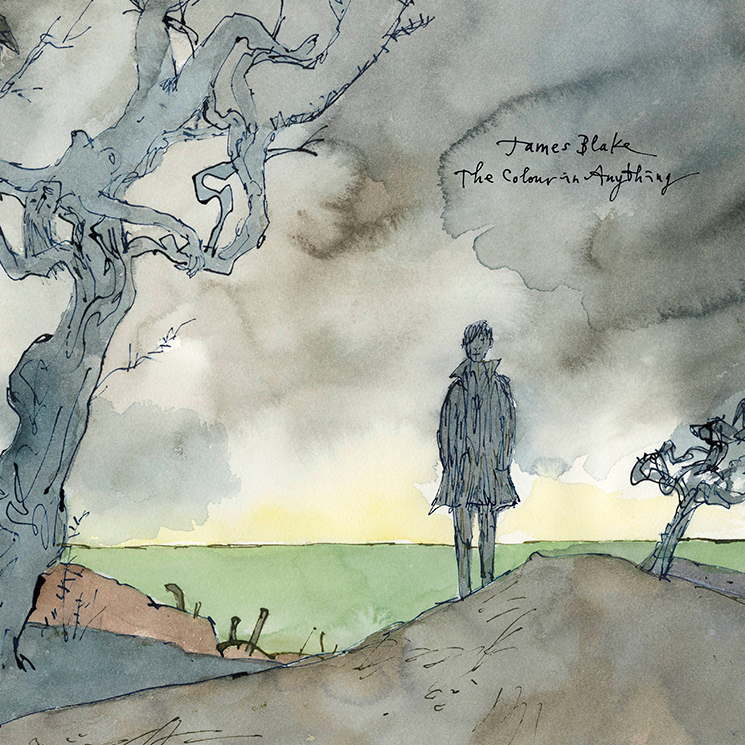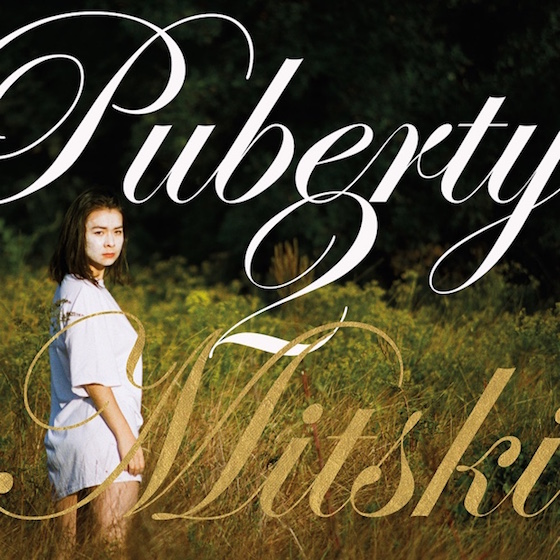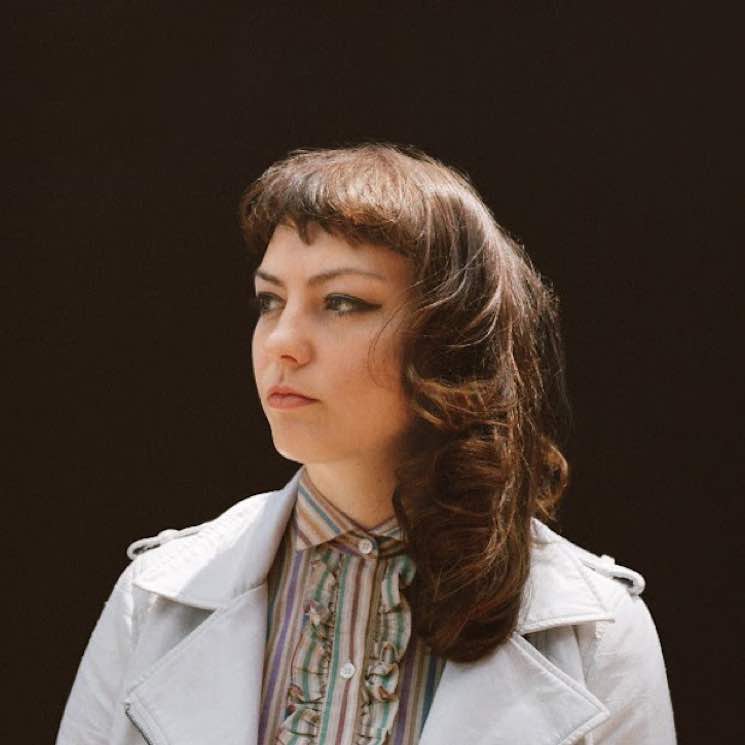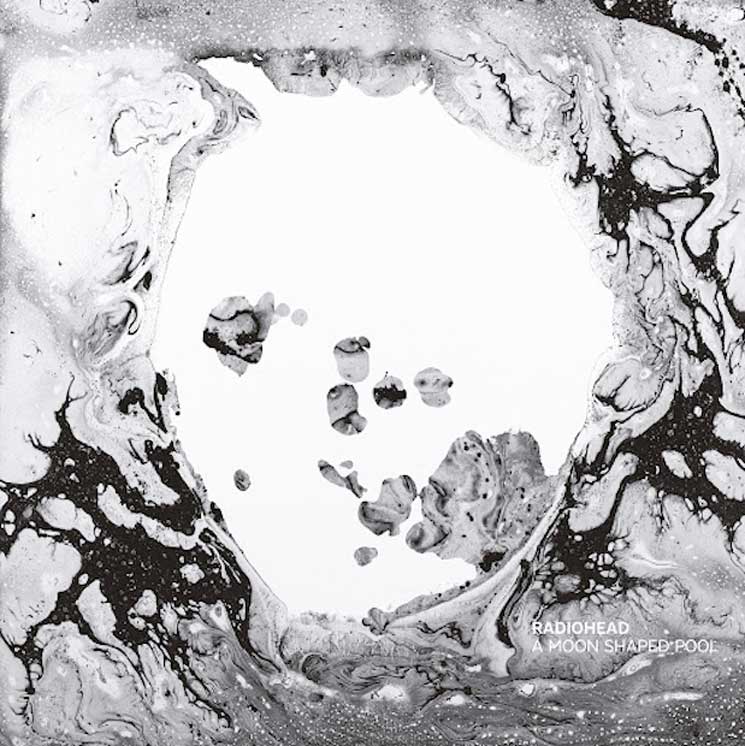Exclaim!'s Best of 2016 albums lists by genre continue today with our staff picks for the 20 best pop and rock albums this year. Yesterday (November 30), we rolled out albums 20 to 11; today, you can see the final part of the list: albums 10 through 1.
Click next to read through the albums one by one, or use the list below to skip ahead to your favourites.
Top 20 Pop & Rock Albums of 2016, 10-1:
10. Leonard Cohen
You Want It Darker
(Columbia)
In a week when we were already reeling from Trump's baffling, ominous win in the American election, we lost Leonard Cohen, our Montreal poet-navigator of the human heart. Whose words could better help us cry and hug one another? Wrench our hearts open that much further so that we could more deeply love and mourn? So that we could, frankly, more deeply appreciate living?
Like David Bowie, Cohen left a farewell album to help himself — and us — prepare. On You Want It Darker, Cohen talks about death and dying, spirituality and religion in language anyone can understand, relating the ultimate unburdening of earthly things at the end of life to the light, unencumbered way we travel in our youth (on "Traveling Light").
Miraculously, even though he is sick at home and dying as he is recording these vocal parts, he still sounds vital as a singer. And unlike some other recent synth-heavy Leonard Cohen albums, You Want It Darker strikes a balance: it gets a good part of its musical strength from solemn, stately strings, warm acoustic instruments (the return of classical guitar) and chanting from the Shaar Hashomayim Synagogue Choir in Montreal. It's powerful, spiritual, moving stuff that still manages to be poppy.
Sarah Greene

9. James Blake
The Colour in Anything
(Universal)
James Blake is a bit of an anomaly, operating in an in-between space within the musical landscape, not quite mainstream but far too popular to be considered anything close to indie. You don't get to work with Bon Iver, Beyoncé, Kanye West and Frank Ocean and keep your indie cred. But with The Colour in Anything, Blake proves that he has no intentions of selling out, either.
Probably his most assured release to date, with a degree of polish that only comes with working with venerated producers like Rick Rubin, his third LP is nothing if not quietly triumphant and resolutely personal. Some argue it's too long, too maudlin, too Blake, but nobody but Blake could have created The Colour in Anything, and that's more than many, if not most, of his contemporaries can say. That is, if he even has any.
Scott Simpson

8. Mitski
Puberty 2
(Dead Oceans)
For my money, there was no more thrilling musical moment on record in 2016 than the chorus's arrival in Mitski's "Your Best American Girl." It's a cathartic, powerful moment, one a lesser (or more obvious) artist would foretell with a more prominent drum fill or guitar riff, but Mitski lets it wash into the mix organically, like a wave's crest crashing into shore, its salt waters blurring vocals and guitars, noise and melody, triumph and regret.
Puberty 2 is full of dizzyingly fluid moments like that, ones that leave you feeling equal parts impressed and off-balance. Mitski meshes stark emotionalism with sonic eclecticism, her hurt songs strung out on indie rock's mad dashes from quiet to loud to quiet again. She has an R&B singer's sense of melody, but a '90s fuzz rocker's taste for dissonance — and in the space between, she weaves some of the year's most beautifully sad songs.
Ryan McNutt

7. Andy Shauf
The Party
(Arts & Crafts)
Though 2015 seemed to be the big year for the Laurel Canyon revival, Andy Shauf kept it lush on his Arts & Crafts debut, The Party, which garnered both critical acclaim and a spot on the Polaris Prize shortlist, and inspired a career-bolstering move to Toronto. But despite Shauf's move to larger pastures, The Party best exemplifies his ability to succeed in small spaces, looking inward to unearth the minute nuances of social interactions that showcase universal humanity.
Shauf's vividly nuanced portrayals of vignettes at an awkward house party — of being too loud, too quiet, too drunk, too sober —are set to a lush, orchestral backdrop; with the exception of strings, he plays every instrument, showcasing a knack for orchestral composition that both recalls legendary balladeers Randy Newman and Harry Nilsson while remaining uncompromisingly unorthodox, as his affinity for the clarinet shows.
Soft-spoken but hard-hitting, Shauf was one of Canada's breakout artists of 2016, The Party is, we hope, just the beginning of the celebration.
Matt Bobkin

6. Angel Olsen
My Woman
(Jagjaguwar)
Angel Olsen's latest record, My Woman, plays out in two parts: one being more accessible, hook-driven and loud, the other softer, far-reaching but intense. Both hold your attention — songs like "Shut Up Kiss Me" and "Not Gonna Kill You" hook immediately, while tunes like "Heart Shaped Face" or "Sister" softly draw your ear in near. Olsen's voice, long a wonder, hits powerhouse levels here, confrontational, personal and devastating, all in equal measure. And oh, so damn good.
My Woman is an evolution of her previous work, more accessible but maintaining the smart lyricism of her earlier records. Despite the arrangements being more expansive and complex, the songs vary in genre and intensity. She teases with synth-heavy opening track "Intern," only to follow that up with the waltzy, bouncy "Never Be Mine." Olsen is doing what she pleases here — unabashedly so — and the result is as satisfying for us to take in as it must have liberating for Olsen to get out.
Cosette Schulz

5. Bon Iver
22, A Million
(Jagjaguwar)
There isn't a moment on 22, A Million when Bon Iver's Justin Vernon isn't impeded by something. His lyrics are driven by doubt and, often, self-hatred: "If it's harmed, it harmed me, it'll harm me, I let it in," sings Vernon in "00000 Million." His voice, as a result, is twisted, shaken and stretched, at times sounding nothing like Vernon's sleepy falsetto that welcomed us to his cabin. His path is not as clear as it was once thought to be, and yet, 22, A Million is the clearest expression yet of Bon Iver's artistic ingenuity.
The exploration of self, love and faith found in the album's lyrics is mirrored in the breathtaking curiosity of its instrumentals. The distorted chaos of "21 M◊◊N WATER," the explosive percussion of "33 'GOD'" and the horns licking around Vernon in "____45_____" all work to push 22, A Million forward and remind us, as Vernon sings in "29 #Strafford APTS": "It's not all then what it seems."
Laura Stanley

4. Beyoncé
Lemonade
(Columbia)
Beyoncé's Lemonade inspired so much incredible black scholarship, feminist, arts and culture writing, and it was inspired by the same (the Lemonade syllabus is amazing). The driving narrator — a woman, a survivor, scorned, broken, a queen, a goddess made mortal (temporarily) by a mere man — contends with not just infidelity, but also gaslighting, subverting gender expectations, intergenerational trauma and pain, historical inequality and deeply entrenched racism.
Lemonade's groundbreaking ambition is further supported by the album's genuinely expansive sonic sprawl. Every track is distinctive, powerful, complex and important. "Freedom" is a foot-stomping resistance anthem, while the electro-R&B groove of "Sorry" makes it the sexiest "middle fingers up" screw you of the 21st Century. "Don't Hurt Yourself" is a blistering psych-rock freakout, "Daddy Lessons" is fiery Southern country gospel, and there's even a heartbreaking piano ballad ("Sandcastles"). Lemonade is more than a remarkable work of art; it's dense, daring, bold perfection.
Andrea Warner

3. Blood Orange
Freetown Sound
(Domino)
As Blood Orange, Devonté Hynes has settled into his rightful musical identity, becoming a visionary that isn't afraid to confront the sociopolitical through the scope of his work. His third album, Freetown Sound, couldn't have arrived at a more crucial time. With the rights of so many minority groups in jeopardy across the world, Hynes provided a voice for them.
Freetown Sound is a deeply political manifesto concerning race, gender and sexuality, but through a remarkably accessible and personal pop lens. Hynes's distinct production style proved to be looser and more experimental than his work with pop starlets like Kylie Minogue and Carly Rae Jepsen (who provided vocals on "Better Than Me"), and yet, with unlimited artistic freedom, Hynes still chose to make some of his most alluring and passionate pop songs to date.
Alongside Beyoncé's Lemonade and Solange's A Seat at the Table, Blood Orange's Freetown Sound was one of 2016's most crucial and uncompromising artistic statements. It also marked the zenith of a career that seems destined to reach even higher.
Cam Lindsay

2. David Bowie
Blackstar
(Columbia)
When The Next Day was released in 2014, David Bowie's first album of new material in a decade was a welcome return for the singer: the songs were solid, the voice strong and the production tasteful. Still, it was a bit disappointing to hear a restlessly creative artist seem to settle for a comfortable "classic Bowie" sound.
Never one to stay in one place for very long, Bowie confounded expectations once more on his 69th birthday by unveiling Blackstar, his most experimental and challenging LP in decades. A relatively concise 40-minute, seven-song cycle, Blackstar unflinchingly addressed the singer's mortality over tense, textured backdrops that mixed industrial guitars and synths, jazzy horns and flurries of skittering, urgent beats. Heady and heavy themes were apparent throughout Blackstar, most prominently on the sprawling title track, "Lazarus" or the wistful "Dollar Days."
Of course, Bowie's unexpected death from liver cancer — an illness he'd been quietly battling during the recording of Blackstar — just two days after the album's release added meaning to the already weighty lyrics, turning the elegant, elegiac closer "I Can't Give Everything Away" into a poignant swansong. In a year marked by the passing of towering figures in popular music, Bowie's flair for dramatic gestures and impeccable timing were unmistakable, even if for just one last time.
Thierry Côté

1. Radiohead
A Moon Shaped Pool
(XL)
In a year that saw some of music's greatest figures pass on, Radiohead took another step towards cementing their place in the pantheon of sonic brilliance with A Moon Shaped Pool. While not as immediate as OK Computer or as radical as Kid A, it will most certainly be recognized in time as their most ornate.
The use of a string section is nothing new in Radiohead's universe, but the arrangements of Jonny Greenwood, brought to life by the London Contemporary Orchestra, take first chair in these songs, to magnificent effect. The percussive playing of "Burn the Witch" gives way to the plaintive, meanderings "Glass Eyes," the commanding draws that close "The Numbers" and the ominous denouement of "Tinker Tailor Soldier Sailor Rich Man Poor Man Beggar Man Thief."
A strange sense of comfort can be found in Thom Yorke's lyrics of love, loss, regret and acceptance, especially in a year when, at times, existence proved exhausting. "This goes beyond me, beyond you," he gently sings on "Daydreaming," and whether the observation was penned as hopeful or helpless, a world in which Radiohead continue to explore and innovate on their own musical terms feels like one worth persevering for.
Calum Slingerland
Click next to read through the albums one by one, or use the list below to skip ahead to your favourites.
Top 20 Pop & Rock Albums of 2016, 10-1:
- 10. Leonard Cohen - You Want It Darker
- 9. James Blake - The Colour in Anything
- 8. Mitski - Puberty 2
- 7. Andy Shauf - The Party
- 6. Angel Olsen - My Woman
- 5. Bon Iver - 22, A Million
- 4. Beyoncé - Lemonade
- 3. Blood Orange - Freetown Sound
- 2. David Bowie - Blackstar
- 1. Radiohead - A Moon Shaped Pool

10. Leonard Cohen
You Want It Darker
(Columbia)
In a week when we were already reeling from Trump's baffling, ominous win in the American election, we lost Leonard Cohen, our Montreal poet-navigator of the human heart. Whose words could better help us cry and hug one another? Wrench our hearts open that much further so that we could more deeply love and mourn? So that we could, frankly, more deeply appreciate living?
Like David Bowie, Cohen left a farewell album to help himself — and us — prepare. On You Want It Darker, Cohen talks about death and dying, spirituality and religion in language anyone can understand, relating the ultimate unburdening of earthly things at the end of life to the light, unencumbered way we travel in our youth (on "Traveling Light").
Miraculously, even though he is sick at home and dying as he is recording these vocal parts, he still sounds vital as a singer. And unlike some other recent synth-heavy Leonard Cohen albums, You Want It Darker strikes a balance: it gets a good part of its musical strength from solemn, stately strings, warm acoustic instruments (the return of classical guitar) and chanting from the Shaar Hashomayim Synagogue Choir in Montreal. It's powerful, spiritual, moving stuff that still manages to be poppy.
Sarah Greene

9. James Blake
The Colour in Anything
(Universal)
James Blake is a bit of an anomaly, operating in an in-between space within the musical landscape, not quite mainstream but far too popular to be considered anything close to indie. You don't get to work with Bon Iver, Beyoncé, Kanye West and Frank Ocean and keep your indie cred. But with The Colour in Anything, Blake proves that he has no intentions of selling out, either.
Probably his most assured release to date, with a degree of polish that only comes with working with venerated producers like Rick Rubin, his third LP is nothing if not quietly triumphant and resolutely personal. Some argue it's too long, too maudlin, too Blake, but nobody but Blake could have created The Colour in Anything, and that's more than many, if not most, of his contemporaries can say. That is, if he even has any.
Scott Simpson

8. Mitski
Puberty 2
(Dead Oceans)
For my money, there was no more thrilling musical moment on record in 2016 than the chorus's arrival in Mitski's "Your Best American Girl." It's a cathartic, powerful moment, one a lesser (or more obvious) artist would foretell with a more prominent drum fill or guitar riff, but Mitski lets it wash into the mix organically, like a wave's crest crashing into shore, its salt waters blurring vocals and guitars, noise and melody, triumph and regret.
Puberty 2 is full of dizzyingly fluid moments like that, ones that leave you feeling equal parts impressed and off-balance. Mitski meshes stark emotionalism with sonic eclecticism, her hurt songs strung out on indie rock's mad dashes from quiet to loud to quiet again. She has an R&B singer's sense of melody, but a '90s fuzz rocker's taste for dissonance — and in the space between, she weaves some of the year's most beautifully sad songs.
Ryan McNutt

7. Andy Shauf
The Party
(Arts & Crafts)
Though 2015 seemed to be the big year for the Laurel Canyon revival, Andy Shauf kept it lush on his Arts & Crafts debut, The Party, which garnered both critical acclaim and a spot on the Polaris Prize shortlist, and inspired a career-bolstering move to Toronto. But despite Shauf's move to larger pastures, The Party best exemplifies his ability to succeed in small spaces, looking inward to unearth the minute nuances of social interactions that showcase universal humanity.
Shauf's vividly nuanced portrayals of vignettes at an awkward house party — of being too loud, too quiet, too drunk, too sober —are set to a lush, orchestral backdrop; with the exception of strings, he plays every instrument, showcasing a knack for orchestral composition that both recalls legendary balladeers Randy Newman and Harry Nilsson while remaining uncompromisingly unorthodox, as his affinity for the clarinet shows.
Soft-spoken but hard-hitting, Shauf was one of Canada's breakout artists of 2016, The Party is, we hope, just the beginning of the celebration.
Matt Bobkin

6. Angel Olsen
My Woman
(Jagjaguwar)
Angel Olsen's latest record, My Woman, plays out in two parts: one being more accessible, hook-driven and loud, the other softer, far-reaching but intense. Both hold your attention — songs like "Shut Up Kiss Me" and "Not Gonna Kill You" hook immediately, while tunes like "Heart Shaped Face" or "Sister" softly draw your ear in near. Olsen's voice, long a wonder, hits powerhouse levels here, confrontational, personal and devastating, all in equal measure. And oh, so damn good.
My Woman is an evolution of her previous work, more accessible but maintaining the smart lyricism of her earlier records. Despite the arrangements being more expansive and complex, the songs vary in genre and intensity. She teases with synth-heavy opening track "Intern," only to follow that up with the waltzy, bouncy "Never Be Mine." Olsen is doing what she pleases here — unabashedly so — and the result is as satisfying for us to take in as it must have liberating for Olsen to get out.
Cosette Schulz

5. Bon Iver
22, A Million
(Jagjaguwar)
There isn't a moment on 22, A Million when Bon Iver's Justin Vernon isn't impeded by something. His lyrics are driven by doubt and, often, self-hatred: "If it's harmed, it harmed me, it'll harm me, I let it in," sings Vernon in "00000 Million." His voice, as a result, is twisted, shaken and stretched, at times sounding nothing like Vernon's sleepy falsetto that welcomed us to his cabin. His path is not as clear as it was once thought to be, and yet, 22, A Million is the clearest expression yet of Bon Iver's artistic ingenuity.
The exploration of self, love and faith found in the album's lyrics is mirrored in the breathtaking curiosity of its instrumentals. The distorted chaos of "21 M◊◊N WATER," the explosive percussion of "33 'GOD'" and the horns licking around Vernon in "____45_____" all work to push 22, A Million forward and remind us, as Vernon sings in "29 #Strafford APTS": "It's not all then what it seems."
Laura Stanley

4. Beyoncé
Lemonade
(Columbia)
Beyoncé's Lemonade inspired so much incredible black scholarship, feminist, arts and culture writing, and it was inspired by the same (the Lemonade syllabus is amazing). The driving narrator — a woman, a survivor, scorned, broken, a queen, a goddess made mortal (temporarily) by a mere man — contends with not just infidelity, but also gaslighting, subverting gender expectations, intergenerational trauma and pain, historical inequality and deeply entrenched racism.
Lemonade's groundbreaking ambition is further supported by the album's genuinely expansive sonic sprawl. Every track is distinctive, powerful, complex and important. "Freedom" is a foot-stomping resistance anthem, while the electro-R&B groove of "Sorry" makes it the sexiest "middle fingers up" screw you of the 21st Century. "Don't Hurt Yourself" is a blistering psych-rock freakout, "Daddy Lessons" is fiery Southern country gospel, and there's even a heartbreaking piano ballad ("Sandcastles"). Lemonade is more than a remarkable work of art; it's dense, daring, bold perfection.
Andrea Warner

3. Blood Orange
Freetown Sound
(Domino)
As Blood Orange, Devonté Hynes has settled into his rightful musical identity, becoming a visionary that isn't afraid to confront the sociopolitical through the scope of his work. His third album, Freetown Sound, couldn't have arrived at a more crucial time. With the rights of so many minority groups in jeopardy across the world, Hynes provided a voice for them.
Freetown Sound is a deeply political manifesto concerning race, gender and sexuality, but through a remarkably accessible and personal pop lens. Hynes's distinct production style proved to be looser and more experimental than his work with pop starlets like Kylie Minogue and Carly Rae Jepsen (who provided vocals on "Better Than Me"), and yet, with unlimited artistic freedom, Hynes still chose to make some of his most alluring and passionate pop songs to date.
Alongside Beyoncé's Lemonade and Solange's A Seat at the Table, Blood Orange's Freetown Sound was one of 2016's most crucial and uncompromising artistic statements. It also marked the zenith of a career that seems destined to reach even higher.
Cam Lindsay

2. David Bowie
Blackstar
(Columbia)
When The Next Day was released in 2014, David Bowie's first album of new material in a decade was a welcome return for the singer: the songs were solid, the voice strong and the production tasteful. Still, it was a bit disappointing to hear a restlessly creative artist seem to settle for a comfortable "classic Bowie" sound.
Never one to stay in one place for very long, Bowie confounded expectations once more on his 69th birthday by unveiling Blackstar, his most experimental and challenging LP in decades. A relatively concise 40-minute, seven-song cycle, Blackstar unflinchingly addressed the singer's mortality over tense, textured backdrops that mixed industrial guitars and synths, jazzy horns and flurries of skittering, urgent beats. Heady and heavy themes were apparent throughout Blackstar, most prominently on the sprawling title track, "Lazarus" or the wistful "Dollar Days."
Of course, Bowie's unexpected death from liver cancer — an illness he'd been quietly battling during the recording of Blackstar — just two days after the album's release added meaning to the already weighty lyrics, turning the elegant, elegiac closer "I Can't Give Everything Away" into a poignant swansong. In a year marked by the passing of towering figures in popular music, Bowie's flair for dramatic gestures and impeccable timing were unmistakable, even if for just one last time.
Thierry Côté

1. Radiohead
A Moon Shaped Pool
(XL)
In a year that saw some of music's greatest figures pass on, Radiohead took another step towards cementing their place in the pantheon of sonic brilliance with A Moon Shaped Pool. While not as immediate as OK Computer or as radical as Kid A, it will most certainly be recognized in time as their most ornate.
The use of a string section is nothing new in Radiohead's universe, but the arrangements of Jonny Greenwood, brought to life by the London Contemporary Orchestra, take first chair in these songs, to magnificent effect. The percussive playing of "Burn the Witch" gives way to the plaintive, meanderings "Glass Eyes," the commanding draws that close "The Numbers" and the ominous denouement of "Tinker Tailor Soldier Sailor Rich Man Poor Man Beggar Man Thief."
A strange sense of comfort can be found in Thom Yorke's lyrics of love, loss, regret and acceptance, especially in a year when, at times, existence proved exhausting. "This goes beyond me, beyond you," he gently sings on "Daydreaming," and whether the observation was penned as hopeful or helpless, a world in which Radiohead continue to explore and innovate on their own musical terms feels like one worth persevering for.
Calum Slingerland
